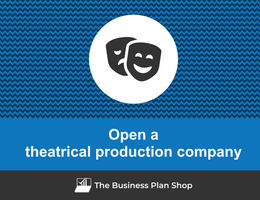How to write a business plan for a theatrical production company?
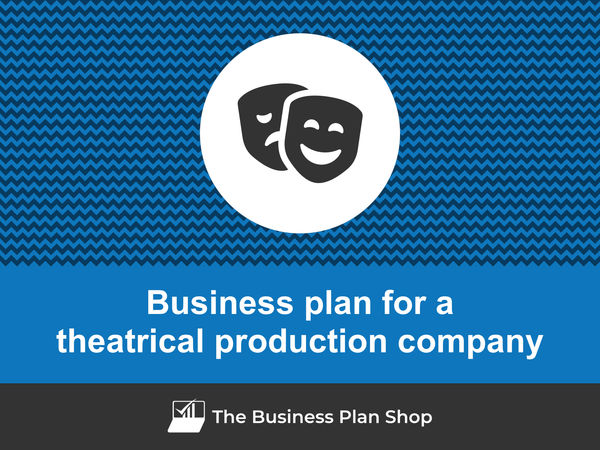
Writing a business plan for a theatrical production company can be an intimidating task, especially for those just starting.
This in-depth guide is designed to help entrepreneurs like you understand how to create a comprehensive business plan so that you can approach the exercise with method and confidence.
We'll cover: why writing a theatrical production company business plan is so important - both when starting up, and when running and growing the business - what information you need to include in your plan, how it should be structured, and what tools you can use to get the job done efficiently.
Let's get started!
Why write a business plan for a theatrical production company?
Being clear on the scope and goals of the document will make it easier to understand its structure and content. So before diving into the actual content of the plan, let's have a quick look at the main reasons why you would want to write a theatrical production company business plan in the first place.
To have a clear roadmap to grow the business
Small businesses rarely experience a constant and predictable environment. Economic cycles go up and down, while the business landscape is mutating constantly with new regulations, technologies, competitors, and consumer behaviours emerging when we least expect it.
In this dynamic context, it's essential to have a clear roadmap for your theatrical production company. Otherwise, you are navigating in the dark which is dangerous given that - as a business owner - your capital is at risk.
That's why crafting a well-thought-out business plan is crucial to ensure the long-term success and sustainability of your venture.
To create an effective business plan, you'll need to take a step-by-step approach. First, you'll have to assess your current position (if you're already in business), and then identify where you'd like your theatrical production company to be in the next three to five years.
Once you have a clear destination for your theatrical production company, you'll focus on three key areas:
- Resources: you'll determine the human, equipment, and capital resources needed to reach your goals successfully.
- Speed: you'll establish the optimal pace at which your business needs to grow if it is to meet its objectives within the desired timeframe.
- Risks: you'll identify and address potential risks you might encounter along the way.
By going through this process regularly, you'll be able to make informed decisions about resource allocation, paving the way for the long-term success of your business.
Need a convincing business plan?
The Business Plan Shop makes it easy to create a financial forecast to assess the potential profitability of your projects, and write a business plan that’ll wow investors.

To get visibility on future cash flows
If your small theatrical production company runs out of cash: it's game over. That's why we often say "cash is king", and it's crucial to have a clear view of your theatrical production company's future cash flows.
So, how can you achieve this? It's simple - you need to have an up-to-date financial forecast.
The good news is that your theatrical production company business plan already includes a financial forecast (which we'll discuss further in this guide). Your task is to ensure it stays current.
To accomplish this, it's essential to regularly compare your actual financial performance with what was planned in your financial forecast. Based on your business's current trajectory, you can make adjustments to the forecast.
By diligently monitoring your theatrical production company's financial health, you'll be able to spot potential financial issues, like unexpected cash shortfalls, early on and take corrective actions. Moreover, this practice will enable you to recognize and capitalize on growth opportunities, such as excess cash flow enabling you to expand to new locations.
To secure financing
Whether you are a startup or an existing business, writing a detailed theatrical production company business plan is essential when seeking financing from banks or investors.
This makes sense given what we've just seen: financiers want to ensure you have a clear roadmap and visibility on your future cash flows.
Banks will use the information included in the plan to assess your borrowing capacity (how much debt your business can support) and your ability to repay the loan before deciding whether they will extend credit to your business and on what terms.
Similarly, investors will review your plan carefully to assess if their investment can generate an attractive return on investment.
To do so, they will be looking for evidence that your theatrical production company has the potential for healthy growth, profitability, and cash flow generation over time.
Now that you understand why it is important to create a business plan for a theatrical production company, let's take a look at what information is needed to create one.
Need a convincing business plan?
The Business Plan Shop makes it easy to create a financial forecast to assess the potential profitability of your projects, and write a business plan that’ll wow investors.

What information is needed to create a business plan for a theatrical production company?
Writing a theatrical production company business plan requires research so that you can project sales, investments and cost accurately in your financial forecast.
In this section, we cover three key pieces of information you should gather before drafting your business plan!
Carrying out market research for a theatrical production company
Before you begin writing your business plan for a theatrical production company, conducting market research is a critical step in ensuring precise and realistic financial projections.
Market research grants you valuable insights into your target customer base, competitors, pricing strategies, and other crucial factors that can impact the success of your business.
In the course of this research, you may stumble upon trends that could impact your theatrical production company.
Your market research could reveal that there may be a growing demand for family-friendly productions, as well as increasing interest in immersive theatrical experiences. It might also indicate that there could be a trend towards more diverse casts and stories, as well as increasing demand for more affordable ticket prices.
Such market trends play a pivotal role in revenue forecasting, as they provide essential data regarding potential customers' spending habits and preferences.
By integrating these findings into your financial projections, you can provide investors with more accurate information, enabling them to make well-informed decisions about investing in your theatrical production company.
Developing the marketing plan for a theatrical production company
Before delving into your theatrical production company business plan, it's imperative to budget for sales and marketing expenses.
To achieve this, a comprehensive sales and marketing plan is essential. This plan should provide an accurate projection of the necessary actions to acquire and retain customers.
Additionally, it will outline the required workforce to carry out these initiatives and the corresponding budget for promotions, advertising, and other marketing endeavours.
By budgeting accordingly, you can ensure that the right resources are allocated to these vital activities, aligning them with the sales and growth objectives outlined in your business plan.
The staffing and equipment needs of a theatrical production company
As you embark on starting or expanding your theatrical production company, having a clear plan for recruitment and capital expenditures (investment in equipment and real estate) is essential for ensuring your business's success.
Both the recruitment and investment plans must align with the timing and level of growth projected in your forecast, and they require appropriate funding.
A theatrical production company might incur costs such as hiring actors, renting costumes, paying for rehearsal space, purchasing props and scenery, hiring a director and crew, and renting sound and lighting equipment. Additionally, they might need to hire a stage manager, a production assistant, and a technical director, as well as pay for any transportation costs associated with the production.
To create a realistic financial forecast, you also need to consider other operating expenses associated with the day-to-day running of your business, such as insurance and bookkeeping.
With all the necessary information at hand, you are ready to begin crafting your business plan and developing your financial forecast.
Need a convincing business plan?
The Business Plan Shop makes it easy to create a financial forecast to assess the potential profitability of your projects, and write a business plan that’ll wow investors.

What goes into your theatrical production company's financial forecast?
The objective of the financial forecast of your theatrical production company's business plan is to show the growth, profitability, funding requirements, and cash generation potential of your business over the next 3 to 5 years.
The four key outputs of a financial forecast for a theatrical production company are:
- The profit and loss (P&L) statement,
- The projected balance sheet,
- The cash flow forecast,
- And the sources and uses table.
Let's look at each of these in a bit more detail.
The projected P&L statement
The projected P&L statement for a theatrical production company shows how much revenue and profits your business is expected to generate in the future.
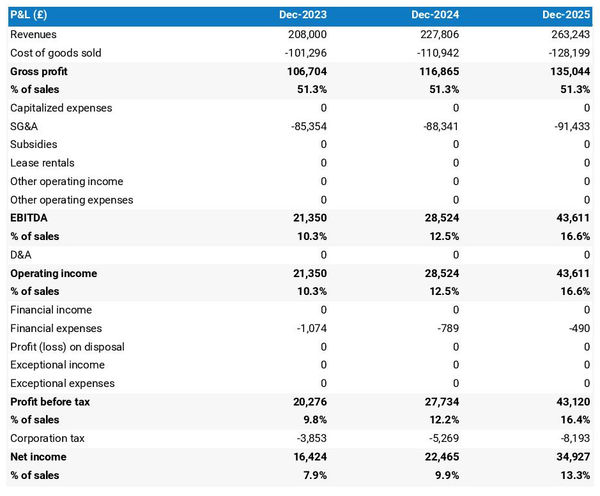
Ideally, your theatrical production company's P&L statement should show:
- Healthy growth - above inflation level
- Improving or stable profit margins
- Positive net profit
Expectations will vary based on the stage of your business. A startup will be expected to grow faster than an established theatrical production company. And similarly, an established company should showcase a higher level of profitability than a new venture.
The forecasted balance sheet of your theatrical production company
The projected balance sheet of your theatrical production company will enable the reader of your business plan to assess the overall financial health of your business.
It shows three elements: assets, liabilities and equity:
- Assets: are productive resources owned by the business, such as equipment, cash, and accounts receivable (money owed by clients).
- Liabilities: are debts owed to creditors, lenders, and other entities, such as accounts payable (money owed to suppliers).
- Equity: includes the sums invested by the shareholders or business owners and the profits and losses accumulated by the business to date (which are called retained earnings). It is a proxy for the value of the owner's stake in the business.
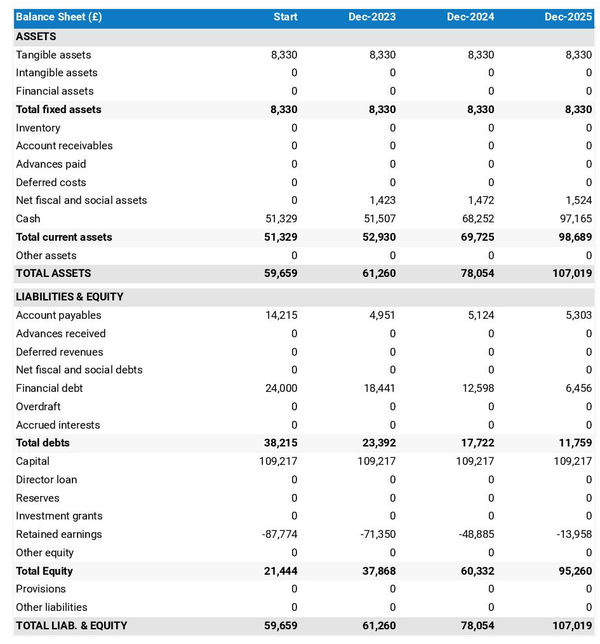
Analysing your theatrical production company projected balance sheet provides an understanding of your theatrical production company's working capital structure, investment and financing policies.
In particular, the readers of your plan can compare the level of financial debt on the balance sheet to the equity value to measure the level of financial risk (equity doesn't need to be reimbursed, while financial debt must be repaid, making it riskier).
They can also use your balance sheet to assess your theatrical production company's liquidity and solvency:
- A liquidity analysis: focuses on whether or not your business has sufficient cash and short-term assets to cover its liabilities due in the next 12 months.
- A solvency analysis: takes and longer view to assess whether or not your business has the capacity to repay its debts over the medium-term.
The cash flow forecast
A projected cash flow statement for a theatrical production company is used to show how much cash the business is generating or consuming.
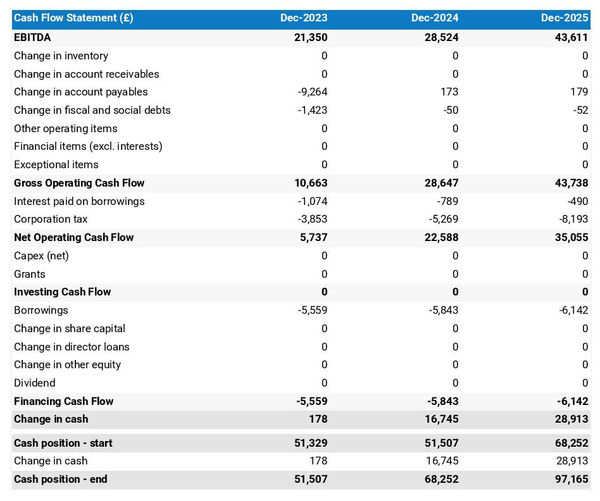
The cash flow forecast is usually organized by nature to show three key metrics:
- The operating cash flow: do the core business activities generate or consume cash?
- The investing cash flow: how much is the business investing in long-term assets (this is usually compared to the level of fixed assets on the balance sheet to assess whether the business is regularly maintaining and renewing its equipment)?
- The financing cash flow: is the business raising new financing or repaying financiers (debt repayment, dividends)?
As we discussed earlier, cash is king and keeping an eye on future cash flows an imperative for running a successful business. Therefore, you can expect the reader of your theatrical production company business plan to pay close attention to your cash flow forecast.
Also, note that it is customary to provide both yearly and monthly cash flow forecasts in a business plan - so that the reader can analyze seasonal variation and ensure the theatrical production company is appropriately funded.
The initial financing plan
The initial financing plan - also called a sources and uses table - is an important tool when starting a theatrical production company.
It shows where the money needed to set up the business will come from (sources) and how it will be allocated (uses).

Having this table helps understand what costs are involved in setting up the theatrical production company, how the risks are distributed between the shareholders and the lenders, and what will be the starting cash position (which needs to be sufficient to sustain operations until the business breaks even).
Now that the financial forecast of a theatrical production company business plan is understood, let's focus on what goes into the written part of the plan.
Need a convincing business plan?
The Business Plan Shop makes it easy to create a financial forecast to assess the potential profitability of your projects, and write a business plan that’ll wow investors.

The written part of a theatrical production company business plan
The written part of a theatrical production company business plan is composed of 7 main sections:
- The executive summary
- The presentation of the company
- The products and services
- The market analysis
- The strategy
- The operations
- The financial plan
Throughout these sections, you will seek to provide the reader with the details and context needed for them to form a view on whether or not your business plan is achievable and your forecast a realistic possibility.
Let's go through the content of each section in more detail!
1. The executive summary
The first section of your theatrical production company's business plan is the executive summary which provides, as its name suggests, an enticing summary of your plan which should hook the reader and make them want to know more about your business.
When writing the executive summary, it is important to provide an overview of the business, the market, the key financials, and what you are asking from the reader.
Start with a brief introduction of the business, its name, concept, location, how long it has been in operation, and what makes it unique. Mention any services or products you plan to offer and who you sell to.
Then you should follow with an overview of the addressable market for your theatrical production company, current trends, and potential growth opportunities.
You should then include a summary of your key financial figures such as projected revenues, profits, and cash flows.
Finally, you should detail any funding requirements in the ask section.
2. The presentation of the company
As you build your theatrical production company business plan, the second section deserves attention as it delves into the structure and ownership, location, and management team of your company.
In the structure and ownership part, you'll provide valuable insights into the legal structure of the business, the identities of the owners, and their respective investments and ownership stakes. This level of transparency is vital, particularly if you're seeking financing, as it clarifies which legal entity will receive the funds and who holds the reins of the business.
Moving to the location part, you'll offer a comprehensive view of the company's premises and articulate why this specific location is strategic for the business, emphasizing factors like catchment area, accessibility, and nearby amenities.
When describing the location of your theatrical production company, you could emphasize the potential that the area offers for your business. You may point out the availability of skilled labor, access to resources, and potential for networking with other professionals in the industry. Additionally, you might discuss the area's potential for growth, as well as its proximity to other major metropolitan areas. You could also highlight the potential for cost savings due to lower operating costs in the region. All of these points could help to emphasize the potential of the area and make a compelling case to potential financiers.
Lastly, you should introduce your esteemed management team. Provide a thorough explanation of each member's role, background, and extensive experience.
It's equally important to highlight any past successes the management team has achieved and underscore the duration they've been working together. This information will instil trust in potential lenders or investors, showcasing the strength and expertise of your leadership team and their ability to deliver the business plan.
3. The products and services section
The products and services section of your business plan should include a detailed description of what your company offers, who are the target customers, and what distribution channels are part of your go-to-market.
For example, your theatrical production company might offer high-quality costuming, set design, and lighting design services to its customers. Costuming services can help a production capture the right aesthetic and period for a given play or musical. Set design offers customers the ability to create a more immersive stage design and lighting design can help to further enhance the atmosphere of the production. Ultimately, these services can help to create a more engaging and professional theatrical performance for the audience and cast.
4. The market analysis
When you present your market analysis in your theatrical production company business plan, it's crucial to include detailed information about customers' demographics and segmentation, target market, competition, barriers to entry, and any relevant regulations.
The main objective of this section is to help the reader understand the size and attractiveness of the market while demonstrating your solid understanding of the industry.
Begin with the demographics and segmentation subsection, providing an overview of the addressable market for your theatrical production company, the key trends in the marketplace, and introducing different customer segments along with their preferences in terms of purchasing habits and budgets.
Next, focus on your target market, zooming in on the specific customer segments your theatrical production company aims to serve and explaining how your products and services fulfil their distinct needs.
For example, your target market might include young professionals in their late 20s and early 30s. These individuals are likely to have disposable income, and appreciate the opportunity to explore their local culture and art scene. They also tend to be more experimental and adventurous when it comes to their entertainment choices, and are likely to attend the theater if they hear good reviews.
Then proceed to the competition subsection, where you introduce your main competitors and highlight what sets you apart from them.
Finally, conclude your market analysis with an overview of the key regulations applicable to your theatrical production company.
Need a convincing business plan?
The Business Plan Shop makes it easy to create a financial forecast to assess the potential profitability of your projects, and write a business plan that’ll wow investors.

5. The strategy section
When crafting the strategy section of your business plan for your theatrical production company, it's important to cover several key aspects, including your competitive edge, pricing strategy, sales & marketing plan, milestones, and risks and mitigants.
In the competitive edge subsection, clearly explain what sets your company apart from competitors. This is particularly critical if you're a startup, as you'll be trying to establish your presence in the marketplace among entrenched players.
The pricing strategy subsection should demonstrate how you aim to maintain profitability while offering competitive prices to your customers.
For the sales & marketing plan, outline how you plan to reach and acquire new customers, as well as retain existing ones through loyalty programs or special offers.
In the milestones subsection, detail what your company has achieved thus far and outline your primary objectives for the coming years by including specific dates for expected progress. This ensures everyone involved has clear expectations.
Lastly, in the risks and mitigants subsection, list the main risks that could potentially impact the execution of your plan. Explain the measures you've taken to minimize these risks. This is vital for investors or lenders to feel confident in supporting your venture - try to proactively address any objection they might have.
Your theatrical production company could face financial risks, such as not having enough funding to produce a show or losing revenue due to unexpected costs. Additionally, the company may be exposed to legal risks, such as copyright infringement or lack of proper permits or insurance. Taking proactive steps to minimize these risks, such as creating a budget, researching copyright laws, and obtaining necessary permits and insurance, could help protect the company from any potential losses.
6. The operations section
In your business plan, it's also essential to provide a detailed overview of the operations of your theatrical production company.
Start by covering your team, highlighting key roles and your recruitment plan to support the expected growth. Outline the qualifications and experience required for each role and your intended recruitment methods, whether through job boards, referrals, or headhunters.
Next, clearly state your theatrical production company's operating hours, allowing the reader to assess staffing levels adequately. Additionally, mention any plans for varying opening times during peak seasons and how you'll handle customer queries outside normal operating hours.
Then, shift your focus to the key assets and intellectual property (IP) necessary for your business. If you rely on licenses, trademarks, physical structures like equipment or property, or lease agreements, make sure to include them in this section.
You may have valuable key assets and IP such as the production rights to a popular play or musical. This could include everything from the script to the music and choreography. You could also have a portfolio of actors that you may have exclusive contracts with for specific projects. Having access to these performers might give your company an edge over the competition.
Lastly, include a list of suppliers you plan to work with, detailing their services and main commercial terms, such as price, payment terms, and contract duration. Investors are interested in understanding why you've chosen specific suppliers, which may be due to higher-quality products or established relationships from previous ventures.
7. The presentation of the financial plan
The financial plan section is where we will present the financial forecast we talked about earlier in this guide.
Now that you have a clear idea of what goes in your theatrical production company business plan, let's look at the solutions you can use to draft yours.
Need a convincing business plan?
The Business Plan Shop makes it easy to create a financial forecast to assess the potential profitability of your projects, and write a business plan that’ll wow investors.

What tool should I use to write my theatrical production company's business plan?
In this section, we will be reviewing the two main solutions for creating a theatrical production company business plan:
- Using specialized online business plan software,
- Outsourcing the plan to the business plan writer.
Using an online business plan software for your theatrical production company's business plan
The modern and most efficient way to write a theatrical production company business plan is to use business plan software.
There are several advantages to using specialized software:
- You can easily create your financial forecast by letting the software take care of the financial calculations for you without errors
- You are guided through the writing process by detailed instructions and examples for each part of the plan
- You can access a library of dozens of complete business plan samples and templates for inspiration
- You get a professional business plan, formatted and ready to be sent to your bank or investors
- You can easily track your actual financial performance against your financial forecast
- You can create scenarios to stress test your forecast's main assumptions
- You can easily update your forecast as time goes by to maintain visibility on future cash flows
- You have a friendly support team on standby to assist you when you are stuck
If you're interested in using this type of solution, you can try The Business Plan Shop for free by signing up here.
Hiring a business plan writer to write your theatrical production company's business plan
Outsourcing your theatrical production company business plan to a business plan writer can also be a viable option.
Business plan writers are skilled in creating error-free business plans and accurate financial forecasts. Moreover, hiring a consultant can save you valuable time, allowing you to focus on day-to-day business operations.
However, it's essential to be aware that hiring business plan writers will be expensive, as you're not only paying for their time but also the software they use and their profit margin.
Based on experience, you should budget at least £1.5k ($2.0k) excluding tax for a comprehensive business plan, and more if you require changes after initial discussions with lenders or investors.
Also, exercise caution when seeking investment. Investors prefer their funds to be directed towards business growth rather than spent on consulting fees. Therefore, the amount you spend on business plan writing services and other consulting services should be insignificant compared to the amount raised.
Keep in mind that one drawback is that you usually don't own the business plan itself; you only receive the output, while the actual document is saved in the consultant's business planning software. This can make it challenging to update the document without retaining the consultant's services.
For these reasons, carefully consider outsourcing your theatrical production company business plan to a business plan writer, weighing the advantages and disadvantages of seeking outside assistance.
Need a convincing business plan?
The Business Plan Shop makes it easy to create a financial forecast to assess the potential profitability of your projects, and write a business plan that’ll wow investors.

Why not create your theatrical production company's business plan using Word or Excel?
Using Microsoft Excel and Word (or their Google, Apple, or open-source equivalents) to write a theatrical production company business plan is a terrible idea.
Why?
For starters, creating an accurate and error-free financial forecast on Excel (or any spreadsheet) is very technical and requires both a strong grasp of accounting principles and solid skills in financial modelling.
As a result, it is unlikely anyone will trust your numbers unless - like us at The Business Plan Shop - you hold a degree in finance and accounting and have significant financial modelling experience in your past.
The second reason is that it is inefficient. Building forecasts on spreadsheets was the only option in the 1990s and early 2000s, nowadays technology has advanced and software can do it much faster and much more accurately.
And with the rise of AI, software is also becoming smarter at helping us detect mistakes in our forecasts and helping us analyse the numbers to make better decisions.
Also, using software makes it easy to compare actuals vs. forecasts and maintain our forecasts up to date to maintain visibility on future cash flows - as we discussed earlier in this guide - whereas this is a pain to do with a spreadsheet.
That's for the forecast, but what about the written part of my theatrical production company business plan?
This part is less error-prone, but here also software brings tremendous gains in productivity:
- Word processors don't include instructions and examples for each part of your business plan
- Word processors don't update your numbers automatically when they change in your forecast
- Word processors don't handle the formatting for you
- ...
Overall, while Word or Excel may be viable options for creating a theatrical production company business plan for some entrepreneurs, it is by far not the best or most efficient solution.
Takeaways
- Having an up-to-date business plan is key to maintaining visibility on your future cash flows.
- A business plan has 2 parts: a financial forecast highlighting the expected growth, profitability and cash generation of the business; and a written part which provides the context needed to interpret and assess the quality of the forecast.
- Using business plan software is the modern way of writing and maintaining business plans.
We hope that this guide helped you to better understand how to write the business plan for a theatrical production company. If you still have questions, do not hesitate to contact us.
Also on The Business Plan Shop
- How to write a 5 years business plan
- Location and facilities in a business plan
- Management team in a business plan
- How to write the structure and ownership section of your business plan?
- Business plan myths
Know someone who owns or wants to start a theatrical production company? Share this article with them!



